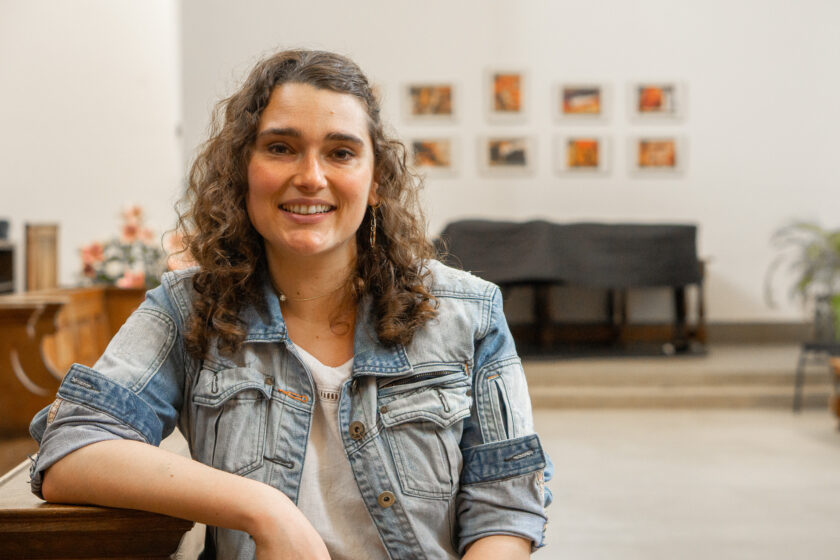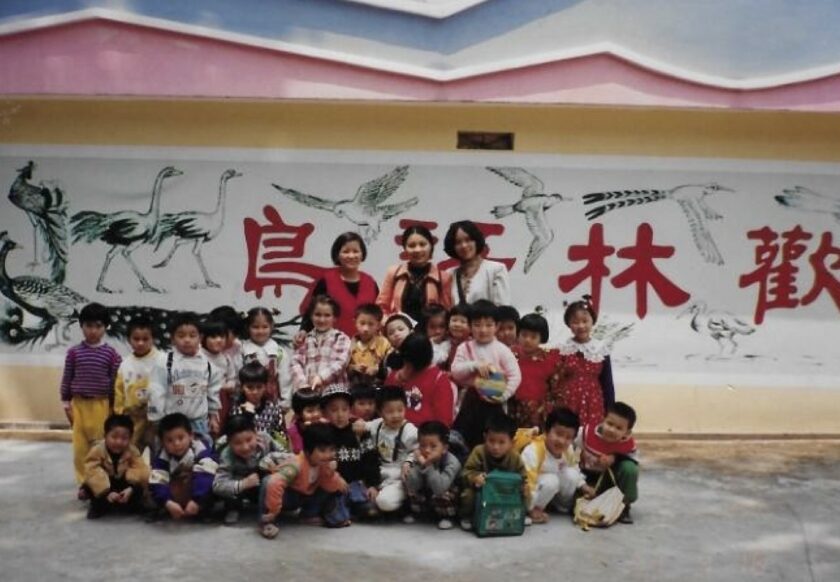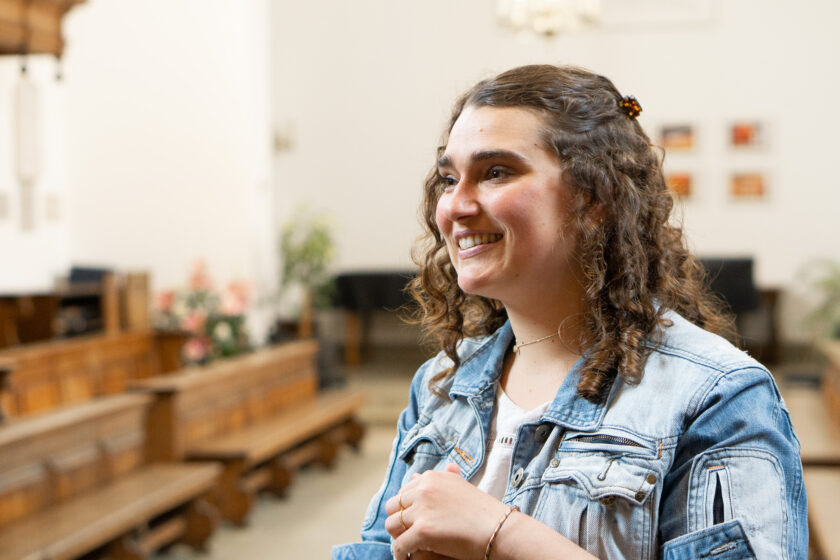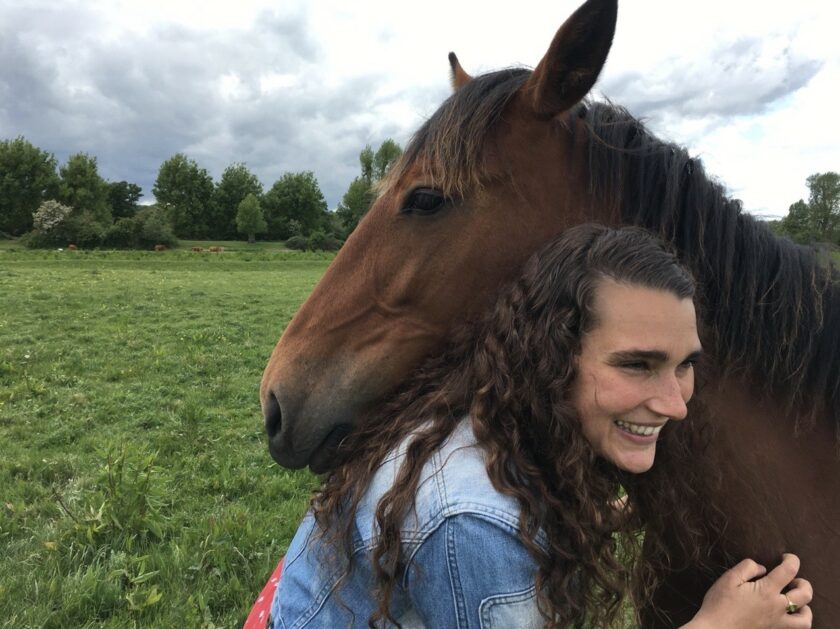In October 2022, we appointed our inaugural Chapel Scholar and Director, Arzhia Habibi.
The Chapel Scholar and Director (who will become the Chapel Junior Research Fellow upon the submission of her DPhil thesis) is an early career academic who acts as convenor of our programme of Choral Contemplation, Somerville’s unique multifaith reimagining of Oxford’s choral tradition which pairs beautiful music with reflections from a variety of faith and philosophical perspectives. We met Arzhia to find out about how her Bahá’i faith and early upbringing in China influences her approach to creating a truly open and welcoming space at the heart of Somerville.

Arzhia Habibi, Somerville’s Chapel Scholar and Director
Your research focuses on China and Chinese culture. Where did that interest come from and how has Chinese culture shaped your outlook?
I grew up in the South-East of China as a child, and attended kindergarten in Fuzhou till I was about 5. This was where I first learnt to speak Mandarin, and I later relearnt the language as I moved back to China at 18. As a child, I often used my hands to try and communicate when my faulty Mandarin failed, so from an early age I had to become interested in cultural bridging and finding ways of connecting among different peoples! Growing up in the Chinese cultural context, and with parents from different backgrounds (Iranian and British-Irish) I’d often ask questions on ‘what it means to belong’, questions which are central to my professional and personal life.

Arzhia and her Kindergarten class in in Fuzhou, China
The idea of education as a vehicle for social justice/greater equality seems fundamental to your work. Why do you think education is so important for widening access?
I think education should be about empowerment and the un-learning of harmful behaviours. It’s also tied to social structures and the need for long-term systemic changes as well as the creation of cultures of kindness and justice. It’s one thing to talk about widening access – but it’s another thing to have a genuinely open and hospitable environment where individuals feel safe and welcome to learn. Education takes so many different shapes and forms, and some of the wisest and most observant people I know have not been to university. I resonated with a quote I read recently from Cornel West who referred to James Baldwin’s learning biography: “…Great geniuses like James Baldwin… never went to college, but college went 𝘵𝘩𝘳𝘰𝘶𝘨𝘩 him…”
What made you interested in the role of Chapel Scholar and Director?
I was drawn to the position because I saw in it the possibility of community building, of creativity and exploring spiritual and social questions in a collaborative and reflective manner. This was something I was trying to practice with friends and community at a neighbourhood and Department level in Oxford, so it didn’t feel far away from what I was doing anyway. Also, right before my interview for the role, I found out about the founder of the Chapel: Emily Georgiana Kemp, and felt drawn to her story, finding resonance with her own engagements and encounters with China. She wrote a book called ‘The Face of China’ in 1909, and there are passages in there which I felt closely aligned with what I’m attempting to do with my doctoral thesis. Another cosmic joke is that her birthday is one day before mine (albeit different century!) Her journey is one I continue to draw on to steady and centre myself as I try to learn and discern what ‘a house of prayer for all people’ might mean in practice at Somerville.
How would you define your spiritual outlook and how do you think it might help inform your work here?
Much of my spiritual outlook draws inspiration from the Bahá’i Faith. Its founder Baha’u’llah expounded the principles of the oneness of religion, the oneness of humanity and the oneness of God. There’s a universalist core to it, a tilt to interdependency, of listening and learning to all faiths, traditions and perspectives, of questioning how justice and unity are intimately connected, and that community building should involve the participation of all.
This aligns perfectly with the spirit of the Chapel. By being attentive to what the college community is concerned with, and our wider local and global context, and by listening to the diverse voices of our speakers (who could be religious figure but also variously community workers, activists, artists, academics, educators, poets, and musicians), I want to find ways to integrate multiple languages and cultures, synthesise the poetic and the sacred, and create a bridging ground for different perspectives and peoples.
I am also really passionate about the central role of the arts in reflection. When we hear music, we become sensitised and receptive to topics of meaning. I am really lucky to work with our Director of Chapel Music, Will Dawes, and the Somerville Choir on this each week. Weaving a contemplative programme which harnesses this power of music, poetry and different sacred writings is also part of my approach to community building within and beyond the College.

A warm welcome always awaits you at Choral Contemplation every Sunday in term at 5.30 PM
What do you hope to achieve during your time as Chapel Scholar?
Creativity, community, connection. I want to practically reckon with Emily Kemp’s idea of ‘Being a house of prayer for all people’. How do we open the doors of the Chapel so that people genuinely feel like they can walk in? I’d also love to be able to deepen the interfaith and arts activities and exchanges the Chapel can offer the community. Finally, I’d like to introduce themes of ecology and care of our natural environment to the Chapel programme, for example by hosting ‘Devotional Walks’ on Port Meadow (where we invite friends and collaborators to come for a long walk where we’d identify different species we see, and incorporate poetic and spiritual writings as part of the walk).
What do you understand by the term ‘global citizenship’ and how might a community like Somerville promote that concept?
The odd thing about the ‘global’ is that in many ways, I think it’s a paradox in that it really comes down to working from where you’re at, and the particular position and circumstances you face. I think we have to learn how to be attentive to the places around us: what are the communities and organisations in Oxford which are supporting processing of justice and cohesion? What are the particular histories that we’re bringing with us to these spaces, and what are the stories and legacies attached to these structures? What does it mean to be brave with how we navigate the different social forces in our lives? I think the term needs to be open and undefined enough for each person to feel like they can relate to it, based on their own particular biography.
Responsibly and ethically promoting a concept like global citizenship must also involve attending to our individual and collective wellbeing. This means learning how to not burn out, to slow down, to be present and listen, to genuinely care, and offer what we can do from a place of honesty and compassion to ourselves and others. Perhaps this is an important dynamic to a grounded expression of global citizenship which can be counter-cultural to the busy and grind cultures of university life.
…and on that topic, you seem to be super-busy! How do you relax when you’re not working?
Aha! You caught me… I’m also not free from these ‘busy’ cultures I speak of. I love to spend time on Port Meadow with the horses – they are such grounded beings, and I see them as friends. I love running on the meadow and exploring Burgess Fields. Long walks, hikes and bike rides are wonderful, too. I’ve done quite a bit of dog-sitting throughout my DPhil journey – dogs are some of the best creatures that walk this planet and teach me what it means to be gentle! I have also learnt a lot from my brother about identification of plant species. Attention to the natural surroundings helps bring me back to my body in a space where we’re often pre-occupied with thinking. My Zumba dance community helps with this, too! Oh and also fantasy, sci-fi, and comedy improv shows are my go to for relaxation…
Choral Contemplation, Somerville’s unique multi-faith reimagining of Oxford’s Choral Evensong tradition, is held every Sunday in full term at 5.30 PM. Those of all faiths and none are welcome to join us for words, music, and thought.

Arzhia making new friends in Port Meadow